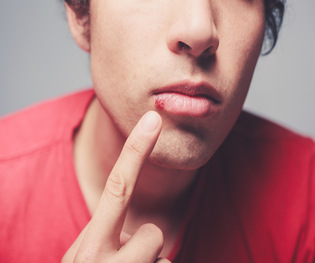It’s the day before your big holiday party or your family reunion and the inevitable happens—you develop a painful and unattractive cold sore. Most cold sores appear on the mouth or lips, but they can also appear on your nose, fingers, chin or cheek.
Cold sores are highly contagious blisters caused by the herpes simplex virus type 1 (HSV-1) and can be contracted by kissing, sharing utensils, glasses or towels or having close contact with an infected person. Once infected, a person may experience recurring cold sores, or some people may develop antibodies that prevent further cold sore outbreaks. If cold sores do recur, outbreaks can be brought on by many factors, including stress, fevers, colds, sun, allergies, menstruation or eating certain foods.
Anyone who suffers from cold sores knows that there is no cure and finding a reliable treatment can be like searching for the holy grail, but there are ways to minimize outbreaks before they occur, or to treat cold sores to shorten their duration and severity. It’s best to treat cold sores early on when you first start to feel the burning or tingling sensation that precedes an outbreak as many remedies lose their efficacy once a cold sore is fully formed.
The best way to treat cold sores is to avoid triggers that bring them on, like stress, illness or sun exposure. Obviously, this isn’t always possible but the following remedies can help to ease pain and reduce cold sore symptoms when outbreaks do occur.
There are many over the counter or prescription remedies for cold sores, antiseptic balms, prescription anesthetic gel or antiviral oral medications. If you’re looking for a more natural approach, there are many alternatives. These include:
- zinc supplements to support your immune system and your body’s ability to fight the virus;
- lemon balm or lemon tea compresses applied to the cold sore, which can reduce and soothe inflammation;
- witch hazel or tea tree oil, which both have antiseptic and antibacterial properties will dry the skin around the cold sore, speeding up healing;
- peppermint oil has been shown to attack the virus and reduce its effects;
- oregano oil to reduce the size of the cold sore, treat inflammation and accelerate recovery;
- honey, particularly raw, unprocessed honey, which helps to kill the virus and shorten the duration of the outbreak;
- L-lysine, an amino acid, can be used to shorten outbreaks and decrease their frequency; and
- light technology, when placed on the cold sore, activates your immune system to focus on the particular area and promote recovery.
Simple habits such as keeping the area clean, washing hands, using sunscreen on lips and not picking at sores will also help to prevent or treat cold sore outbreaks.









